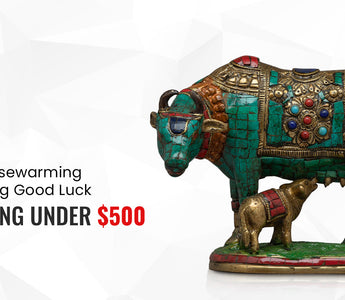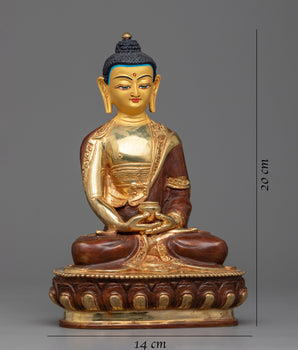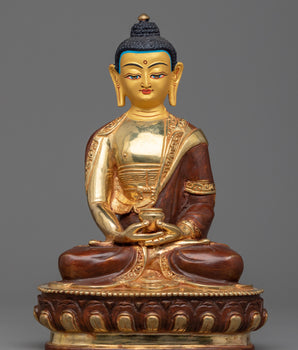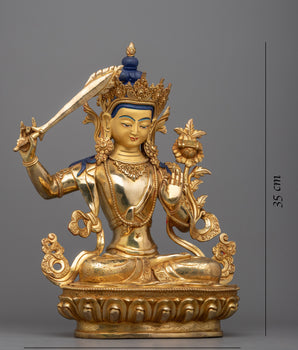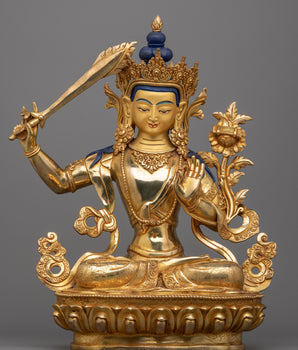Enlightened Elegance: The Best House Warming Buddhist Gifts for Every Home
A significant adjustment is relocating to a new residence. According to Buddhist tradition, some objects significantly affect the energy and ambiance of a new place. In addition to being aesthetically pleasing, these 10 auspicious presents under $500 have deep spiritual meaning and the power to draw good luck.
Key Takeaways
- Each gift carries profound symbolic meanings intended to foster peace and good fortune.
- Cultural Richness: The items are steeped in Buddhist symbolism and tradition.
- Affordable Elegance: All gifts are meaningful and financially accessible, making them ideal for housewarming.
6mm Rosewood Mala Beads (Spiritual Meditation Tool)
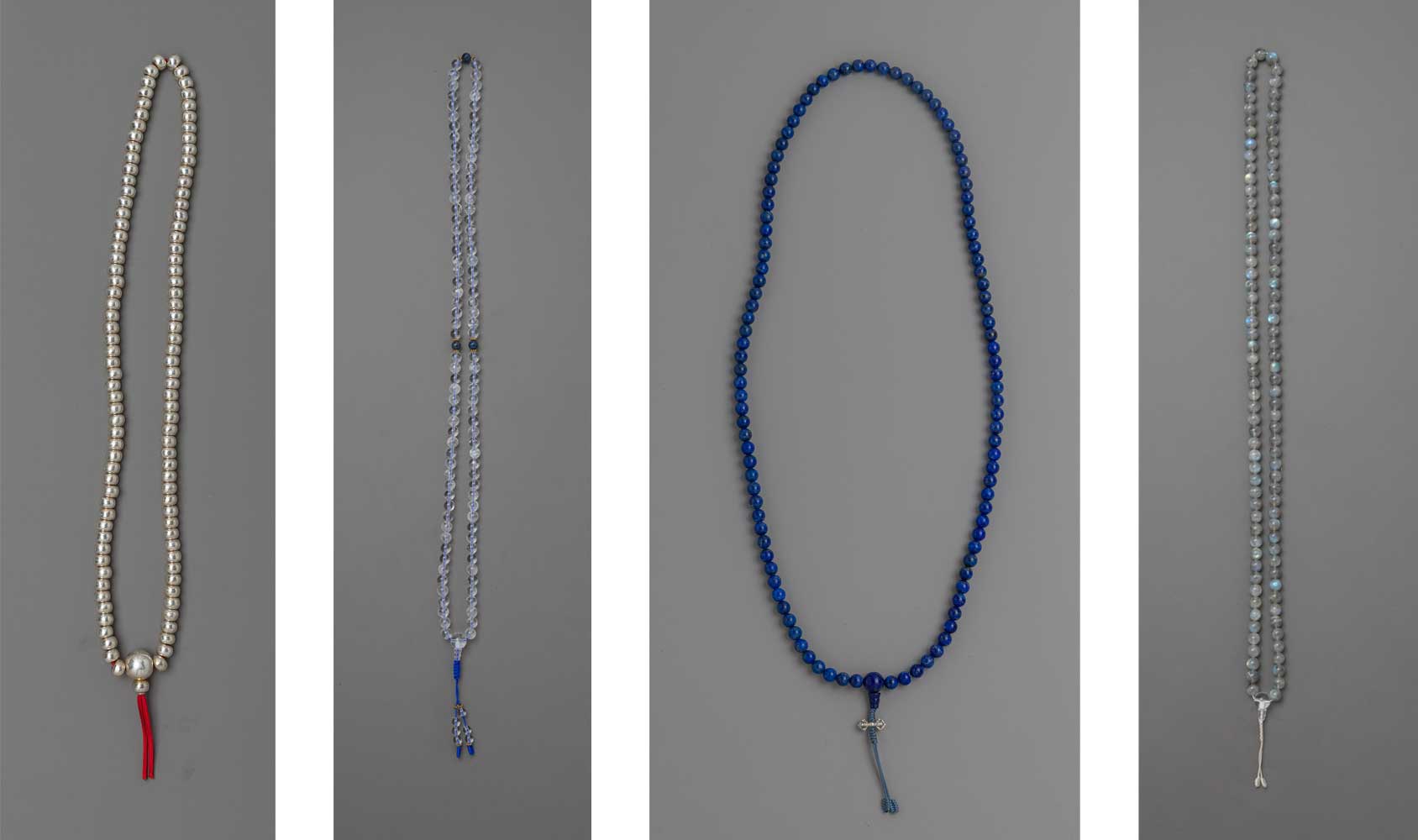
Click here to view our Buddhist Mala Beads
- Handcrafted in Nepal using rosewood
- Traditional mala beads for meditation and prayer
- Promotes mindfulness and spiritual practices
- Represents Nepal's Buddhist/Hindu cultural heritage
- Under $100 budget-friendly option
Symbolism and Use
Mala beads are an essential part of Buddhist meditation practices because they facilitate counting mantras, improving concentration and spiritual discipline. In particular, rosewood is utilized for its relaxing effects and is said to protect against bad energy. Perfect for a new house, its warm hue and texture also foster a feeling of coziness and welcome.
Significance
Mala beads represent the impermanence lessons taught by the Buddha. Their circular shape symbolizes life's endless cycle and spiritual development. Because they serve as a constant reminder of life's fleeting nature and the need for awareness, they are particularly important gifts for those starting a new chapter in their lives.
|
Property |
Description |
|
Material |
Rosewood |
|
Use |
Meditation |
|
Benefit |
|
Tibetan Mandalas Set (Sacred Symbols in Circular Bliss)
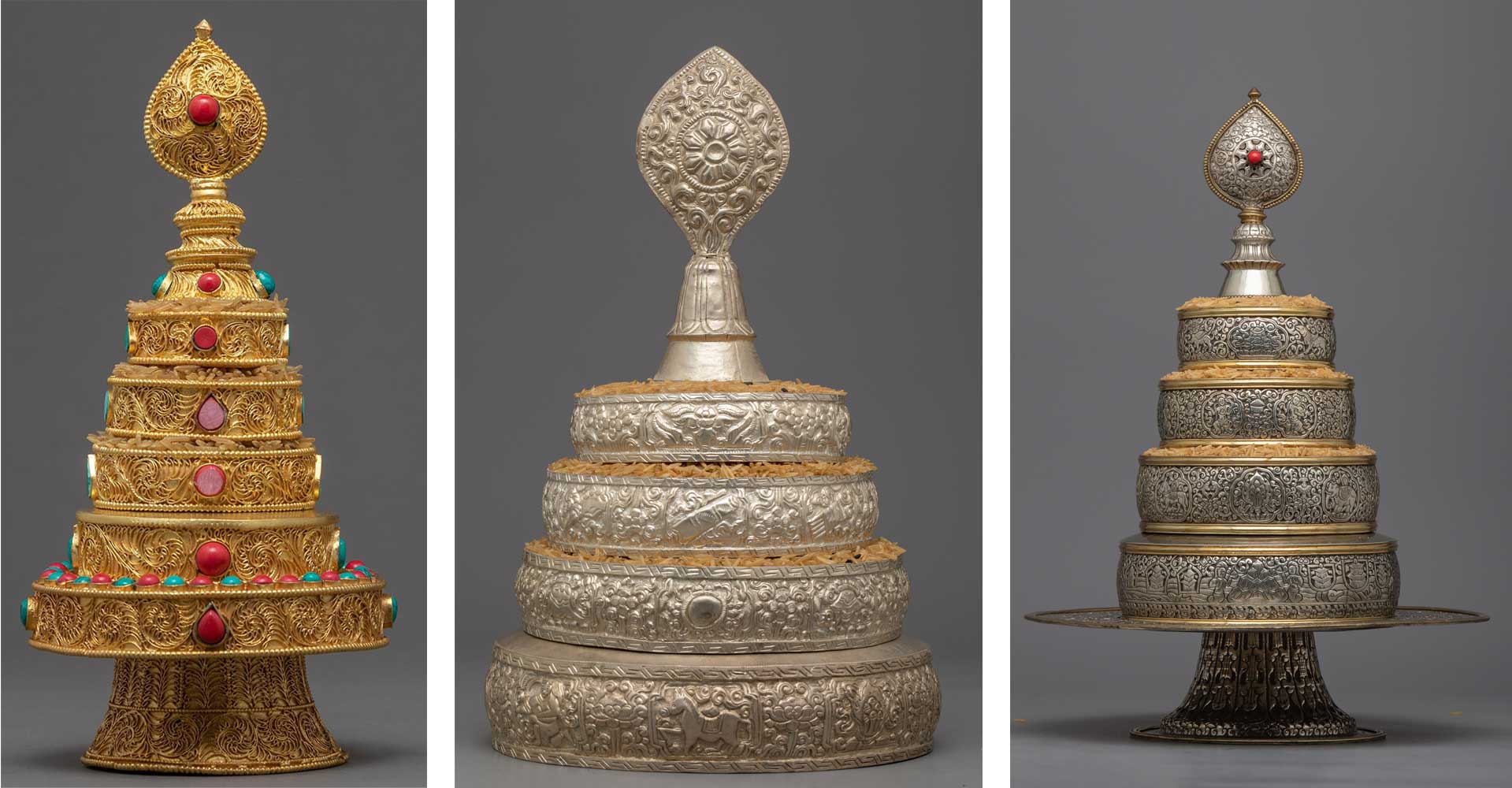
Click here to view our Tibetan Mandala Set
- Handmade mandala paintings on cloth
- Mandala designs hold sacred geometric meanings
- Beautiful wall hangings for meditation spaces
- Insight into ancient Tibetan Buddhist artistic traditions
Symbolism and Use
Mandalas are a valuable tool for attaining understanding and compassion via meditation. In Hindu and Buddhist iconography, they represent the cosmos. The complex hues and patterns are intended to captivate the mind in a way that facilitates thought release and enlightenment. They promote the assimilation of the intricacy and beauty of the cosmos into individual spiritual activities.
Significance
The mandala's pattern, consisting of a circle inside a square, marks the division between the holy and the profane. It guides practitioners in following the Middle Way between material attachments and spiritual enlightenment, teaching the lesson of the Buddha's path.
|
Property |
Description |
|
Material |
Various (Copper, Gold, Silver) |
|
Use |
Meditation, Decor |
|
Benefit |
|
Handcarved Ritual Shankha (Sacred Conch Shell for Ceremonies)
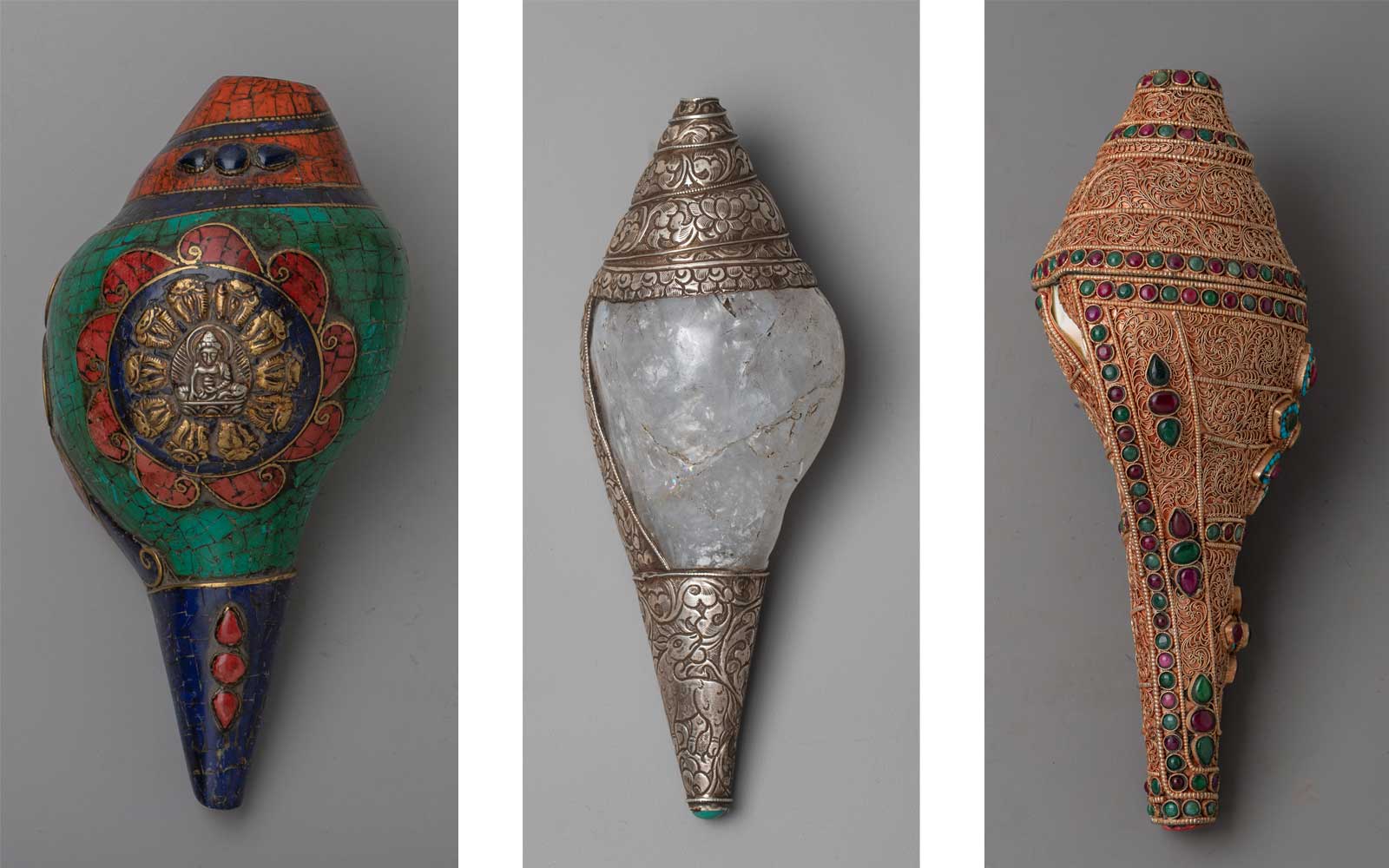
Click here to view our Buddhist Conch Shell
- Intricate hand-carved detailing on conch shell
- Used in Hindu rituals and ceremonies
- Believed to bring good fortune
- Showcases skilled Nepalese shell craftsmanship
Symbolism and Use
In Buddhism, the conch shell, or Shankha, is a holy symbol invoked during devotional rituals. Its voice, which resonates with the earth's deep tones, is said to purify and consecrate the surroundings. At the start of ceremonies, it is blown to rid the air of residual negativity and is employed in rituals to fend off evil spirits.
Significance
According to Buddhist traditions, the conch shell's voice could carry the Buddha's teachings across enormous distances, just like the dharma has a resonating reality. It is a powerful emblem of spiritual authority and purification because of its associations with cleanliness and the holy sound.
|
Property |
Description |
|
Material |
Conch Shell, Copper, Silver, Gold, Gemstones |
|
Use |
Ceremonial |
|
Benefit |
|
Auspicious Symbols (Symbolic Decor for Positive Energy)
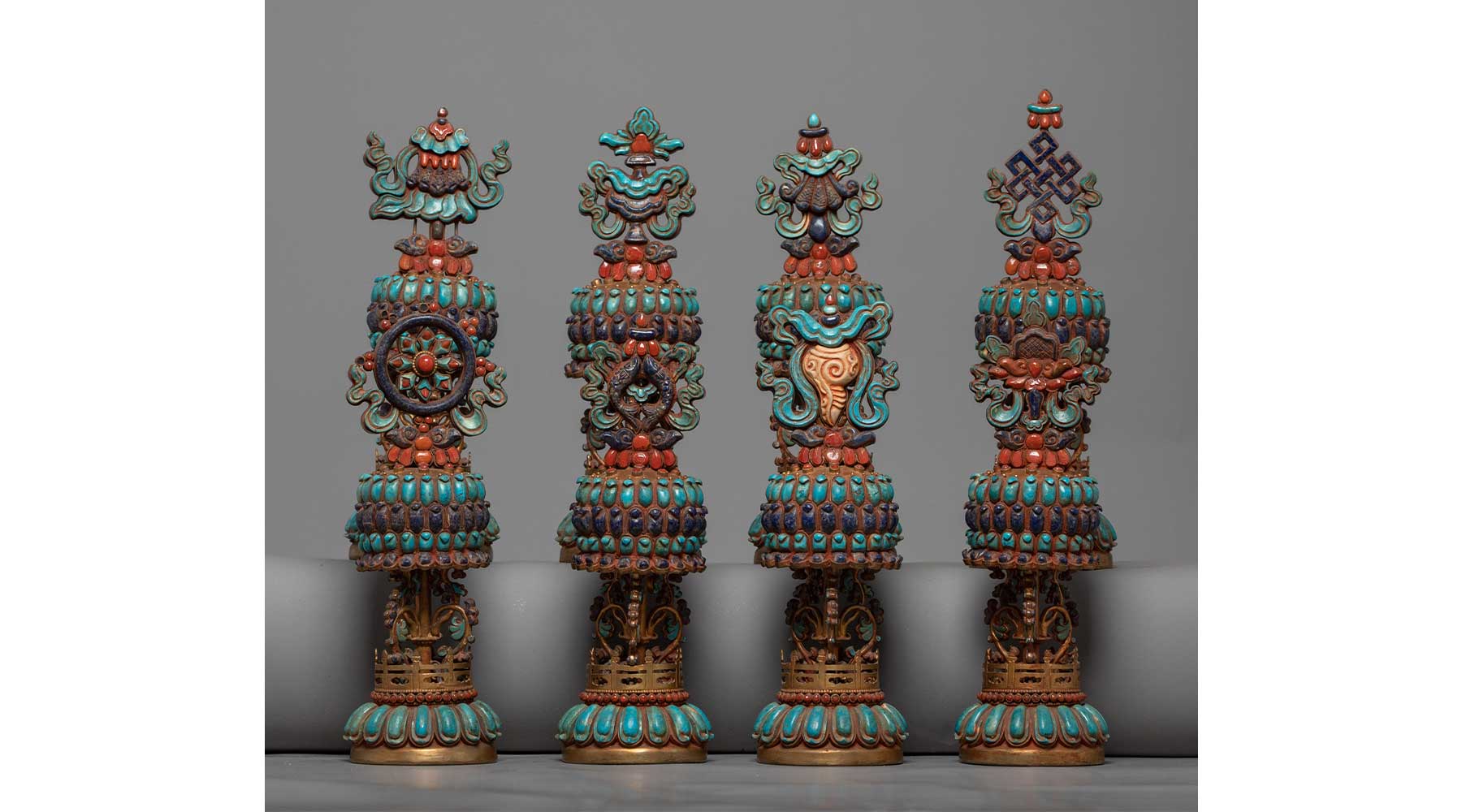
Click here to view our Eight Auspicious Symbol
- Handcrafted brass symbols like swastika, endless knot
- Ancient auspicious symbols in Dharmic traditions
- Add positive energy and good vibes to living spaces
- Insight into Nepalese metalwork artistry
Symbolism and Use
Auspicious symbols, essential lessons in Buddhism, are frequently employed in rituals and décor in Buddhist culture. The Dharmachakra, Lotus, Endless Knot, and other fortunate symbols made of brass represent the teachings of the Buddha that promote compassion, knowledge, purity, and the everlasting cycle of life.
Significance
These depictions serve as visual cues to stay on the path to enlightenment and help direct one's thoughts toward the Buddha's teachings. By putting these symbols throughout a home, one may encourage guests and inhabitants to practice these values daily.
|
Property |
Description |
|
Material |
Brass, Copper, Gold, Silver |
|
Use |
Decor, spiritual reminder |
|
Benefit |
|
24k Gold Plated Brass Stupa (Devotional Piece for Sacred Offering)
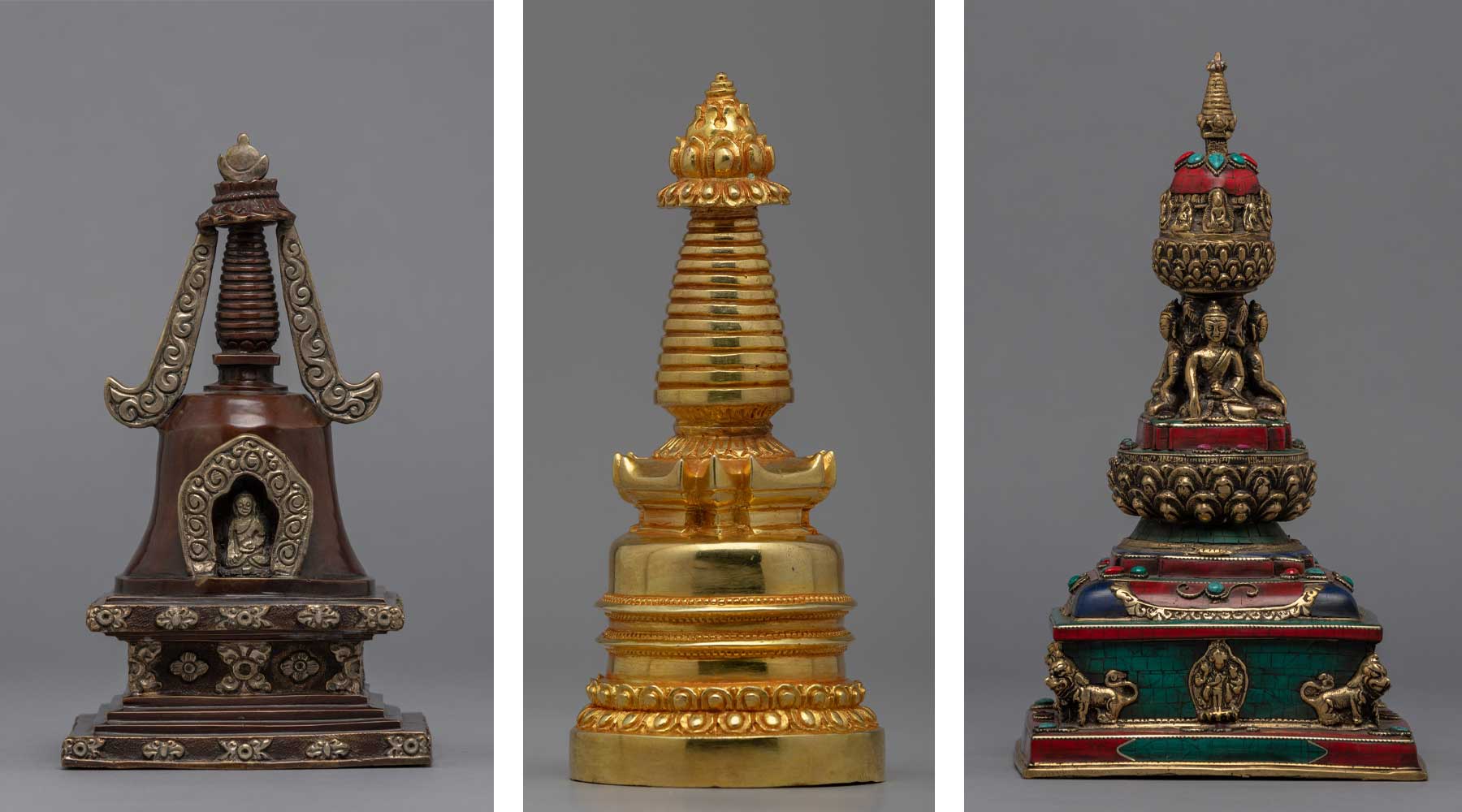
Click here to view our Buddhist Stupa
- The stupa is important Buddhist architectural symbol
- Gold-plated for a luxurious look and sacred value
- Use for meditation, prayer, or decoration
- The epitome of Nepal's religious art and metalwork
Symbolism and Use
A stupa is a monument with symbolic meaning that symbolizes many aspects of the road to enlightenment. In Buddhist practice, the 24k Gold-Plated Brass Stupa is a religious focal point frequently utilized for meditation and holds offerings or holy relics.
Significance
Stupas, which stand for harmony in the cosmos, prosperity, and peace, are architectural representations of the Buddha's thoughts and teachings. In Buddhist cosmology, they act as a microcosm of the cosmos, fostering harmony and serenity.
|
Property |
Description |
|
Material |
Gold-plated Brass, Copper, Silver, Gold |
|
Use |
Devotional, meditation |
|
Benefit |
|
Handmade Traditional Ghau Box (Exquisite Tibetan Craftsmanship for Sacred Treasures)
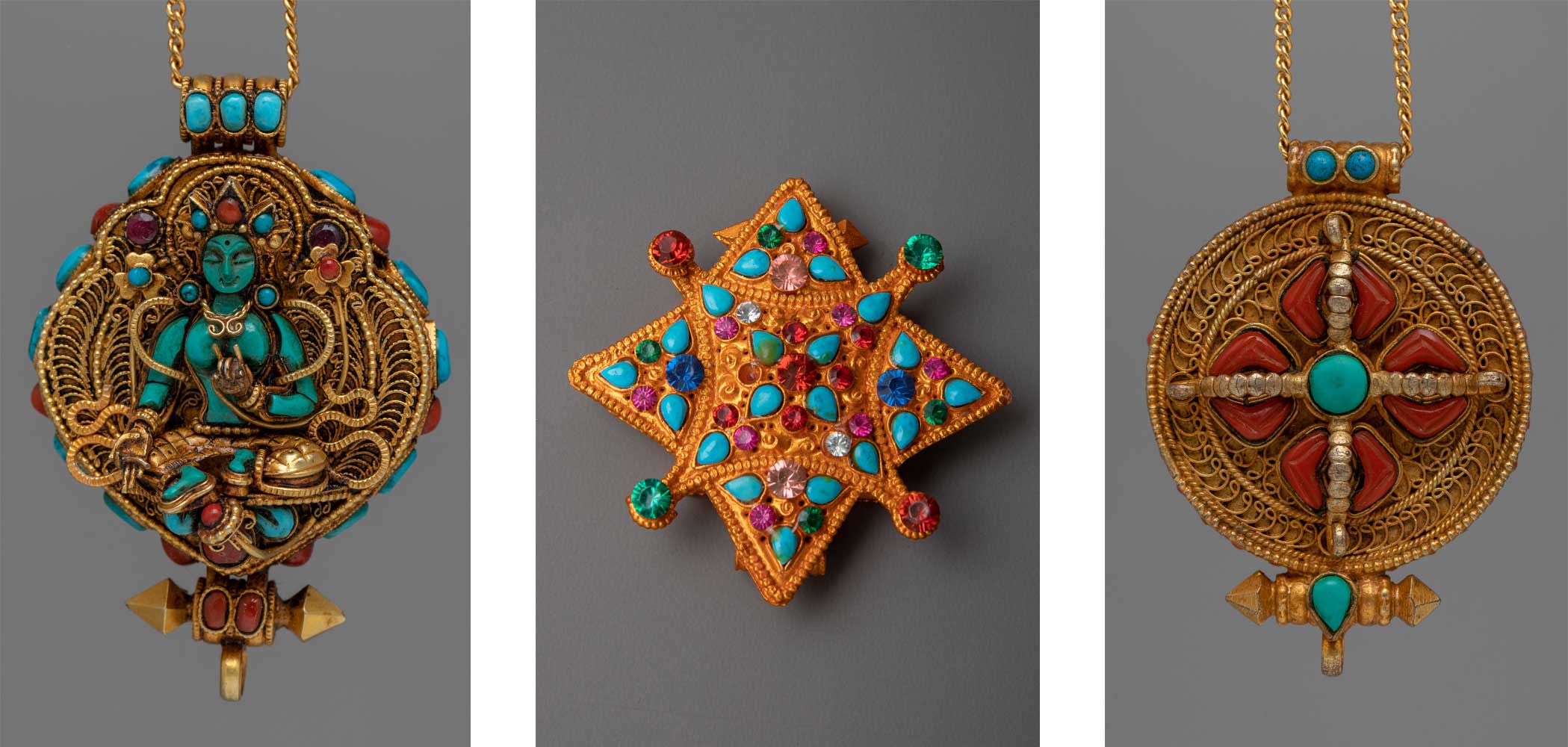
Click here to view our Tibetan Ghau Boxes
- Intricate handcrafted designs from skilled Tibetan artisans
- Decorative box to store tiny treasures/keepsakes
- A beautiful example of ancient Tibetan crafting traditions
- Brings cultural richness to home decor
Symbolism and Use
Traditionally used as a mobile shrine by Tibetan nomads, the Ghau box contains holy objects like texts, artifacts, or representations of gods. It is beautifully crafted and frequently worn as jewelry to bring blessings and protection.
Significance
This box represents the idea of ongoing protection and spiritual presence, serving as a guardian for one's particular precious objects. It is a continual reminder of one's spiritual obligations and a tangible symbol of devotion.
|
Property |
Description |
|
Material |
Mixed Materials, Copper, Silver, Gold |
|
Use |
Storage for sacred items, decoration |
|
Benefit |
|
Jasper Pendant (Delicate Stone Jewelry Creation)
Click here to view our Tibetan Accessories
- Features jasper, a nurturing semiprecious stone
- Simple yet elegant everyday jewelry piece
- Handmade by skilled Nepalese artisan jewelers
- Lightweight accessory from the Himalayas
Symbolism and Use
In gemology, jasper is a nurturing stone that is well-known for its therapeutic and defensive qualities. It is frequently worn as a necklace to provide solace, fend against negativity, and balance one's aura.
Significance
Jasper stones are said to balance the body's spiritual and physical energy and align the chakras. They are especially prized for their capacity to impart serenity and a sense of groundedness.
|
Property |
Description |
|
Material |
Jasper Stone |
|
Use |
Jewelry, spiritual aid |
|
Benefit |
|
Hand Painted Tibetan Thangka
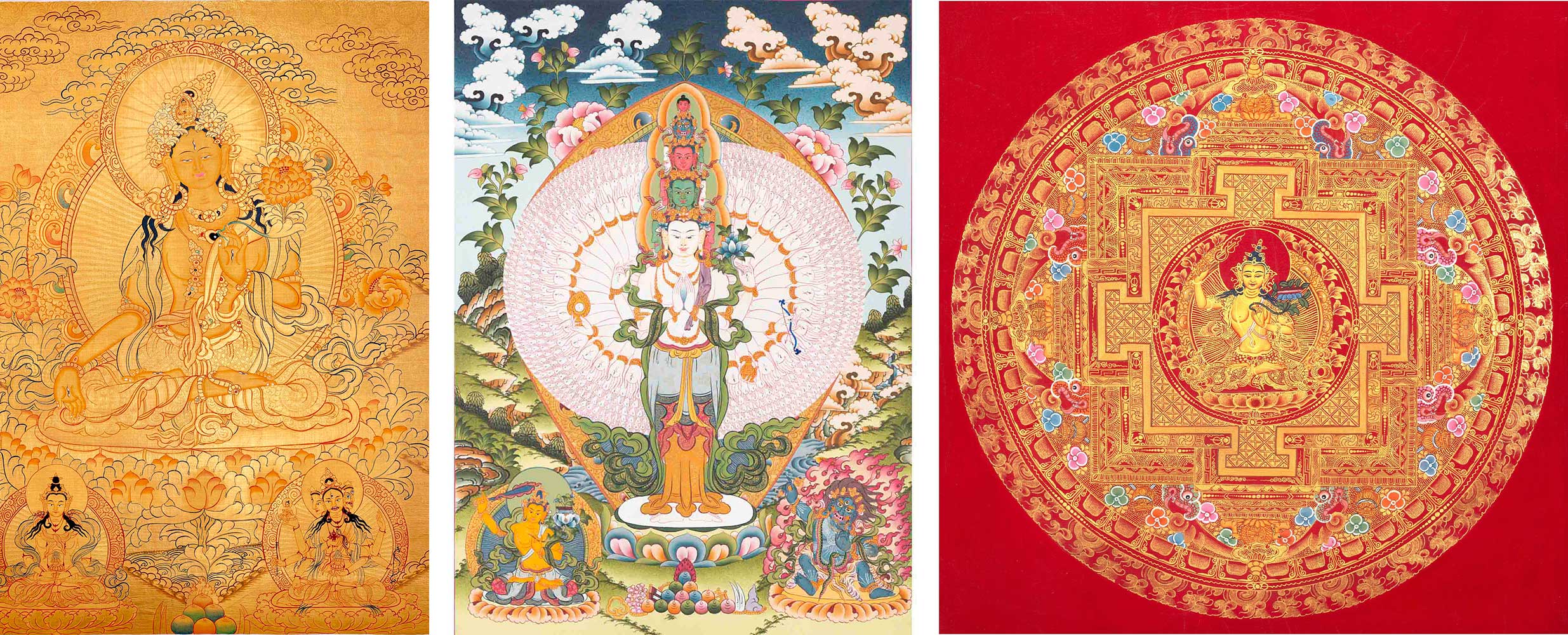
-
An intricately detailed depiction of Buddhist deities and mandalas
- Hand-painted with vibrant colors and fine brushwork
- Versatile in use for meditation, devotional practices, or as a decorative piece
- Embodies the rich cultural heritage of Tibetan Buddhism
Symbolism and Use
The Tibetan Thangka serves as a picture of Buddhist teachings and spiritual ideas. Deeply symbolic sceneries, mandalas, and deities are painted with each brushstroke, guiding practitioners on their spiritual path. These thangkas are focus points for meditation and introspection when hung in houses or meditation areas.
Significance
Tibetan Thangkas, like little stupas, have great significance in Buddhist practice. They are said to operate as portals into the divine domain, providing glimmers of illumination and supporting visualization exercises. Through introspection on the images in the thangka, practitioners aim to develop inner tranquility and a deeper comprehension of Buddhist teachings.
|
Property |
Description |
|
Material |
Fine Silk or cotton canvas adorned with natural pigments or gold leaf |
|
Use |
Meditation, devotional practices, spiritual contemplation |
|
Benefit |
|
Buddhist Statues (for Home Decor & Buddhist Home Altar)
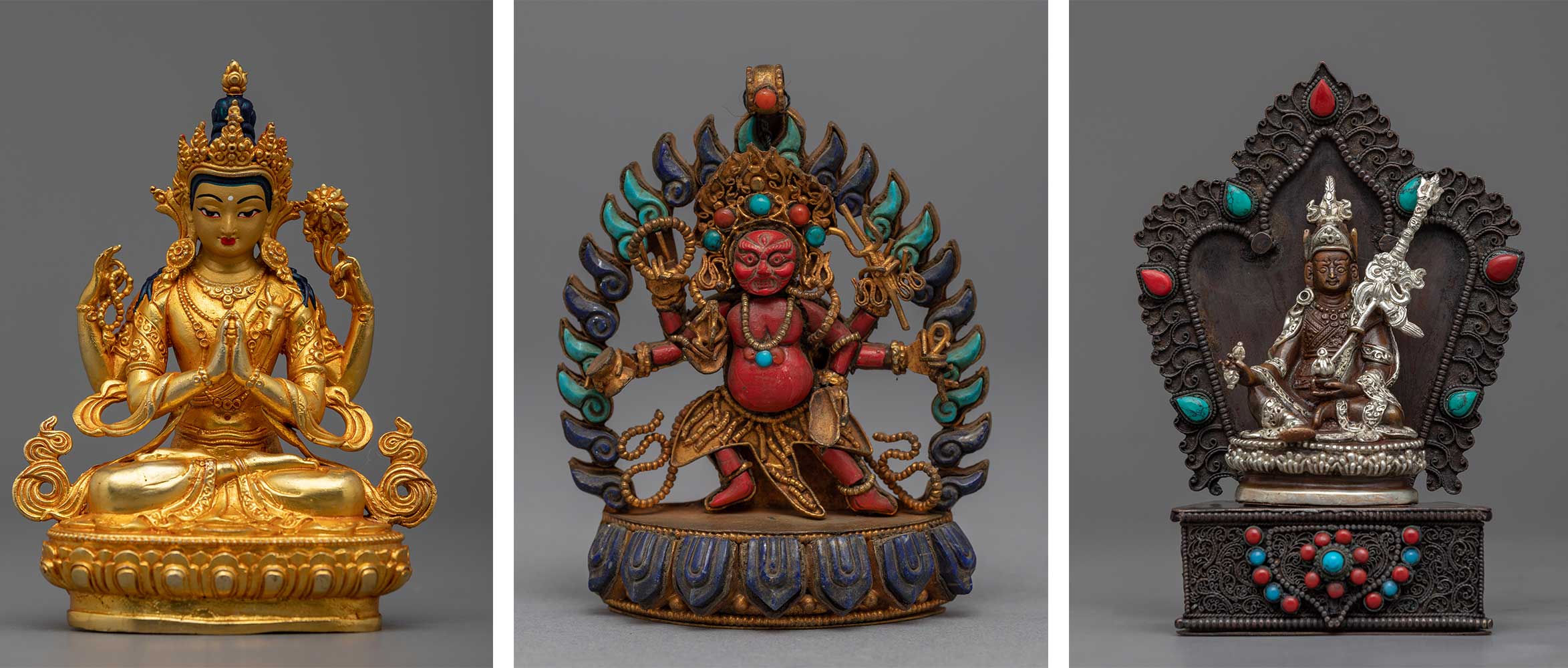
-
A sacred representation of Buddha or revered Bodhisattvas
- Crafted with meticulous attention to detail, capturing serene expressions and graceful postures
- Serves as a focal point for meditation, prayer, and reverence
- Embodies the spiritual essence of Buddhism and its teachings
Symbolism and Use
The Buddhist Statue are easily available under $500 is precious since it is a physical representation of Buddhist principles. These sculptures, which often feature the tranquil face of a Buddha or the caring expression of a Bodhisattva, are highly esteemed for their capacity to arouse devotion and enhance spiritual practice. Whether arranged on altars or in hallowed areas, they are objects of affection and a reminder of enlightenment.
Significance
Buddhist devotion and practice revolve around Buddhist statues. They are seen as emblems of enlightenment and channels for spiritual energy. By gazing upon the statue with reverence and affection, practitioners aim to link themselves with the Buddha's teachings and acquire inner traits like compassion, wisdom, and inner peace.
|
Property |
Description |
|
Material |
Copper, Gold, Silver (often adorned with intricate ornamentation or gilding.) |
|
Use |
Meditation, prayer, devotional practices |
|
Benefit |
|
Brass Wind Chimes (Harmonious Sound for Positive Energy)
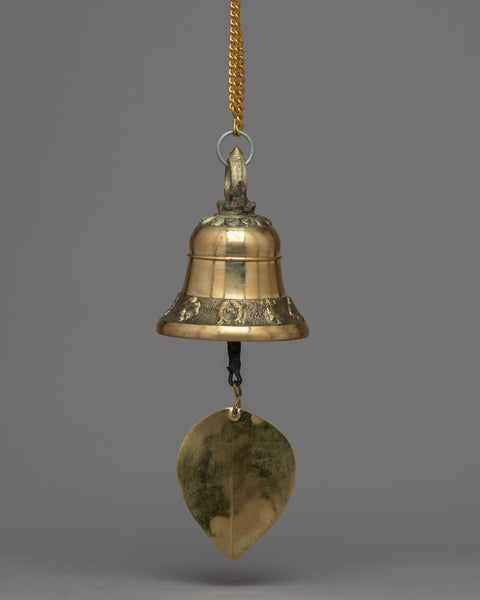
- Handcrafted brass symbols like swastika, endless knot
- Ancient auspicious symbols in Dharmic traditions
- Add positive energy and good vibes to living spaces
- Insight into Nepalese metalwork artistry
Symbolism and Use
Buddhism uses wind chimes to release negative energy and draw in positive energy, making them more than ornamental items. These chimes have more profound spiritual implications when made with fortunate symbols carved in brass. Each ring emits divine vibrations that uplift and cleanse the home's environment.
Significance
The soft tones produced by wind chimes are thought to be the voice of the Buddha, dispersing compassion and knowledge. The fortunate symbols further enhance this impact, turning the chimes into a powerful instrument for spiritual harmony.
|
Property |
Description |
|
Material |
Brass |
|
Use |
Decor, energy purification |
|
Benefit |
|
These housewarming presents are ideal for infusing a new place with happiness, success, and serenity since they each provide a unique fusion of spiritual meaning and valuable beauty. Selecting one of these well-considered and culturally diverse presents will not only celebrate the recipient's fresh start but also give them a resource for further spiritual development and good fortune.
These kind and spiritually meaningful presents make a house seem lovely and give it a peaceful, upbeat vibe. Every item is infused with centuries of Buddhist history and meaning, so they are not only presents but also blessings for a new residence.
EvamRatna's collection of nature-inspired jewelry and decorative pieces celebrates the harmonious relationship between humanity and the natural world. Every piece is imbued with the rich cultural traditions of Nepal, fusing creative skill with spiritual importance and bringing harmony, balance, and connection into any living area.

